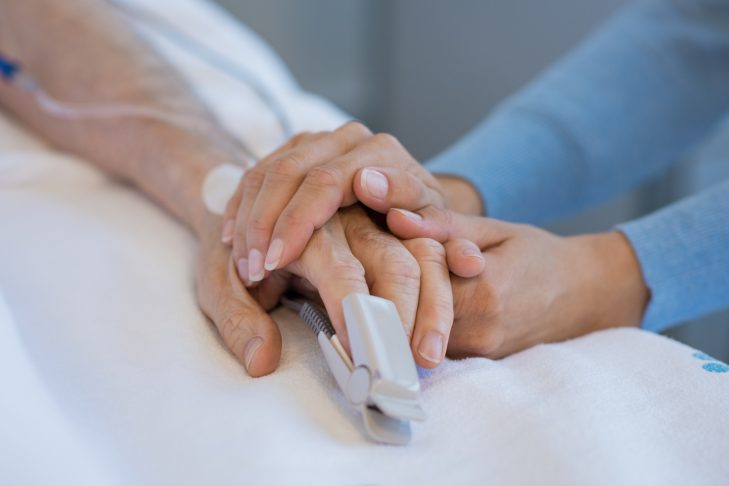I have spent the last nine days on the oncology floor of Hadassah Hospital in Jerusalem being with my 94-year-old father, Rabbi Arnold Goodman. I had always heard of Hadassah, of course. A lot of members of our Greater Boston Jewish community are deeply connected to Hadassah, are members of the leadership team, locally, nationally and internationally, of Hadassah. I had seen the Chagall windows on various Israel missions. But living many hours a day at Hadassah as a daughter of a patient has given me a glimpse of the Jewish people, and of the Jewish state, that I had never seen before. As we enter the secular new year, here are four learnings from Hadassah that can inspire us to aspire higher.
All Jews Are Interconnected—Kol Yisrael Arevim Zeh Bazeh
My father was at Hadassah all eight days and all eight nights of Hanukkah. Candle-lighting in the community room of the oncology floor was something you have to see to believe. Members of a very traditional Hasidic sect, Toldos Aharon, who have lived in Jerusalem for many generations, gathered with Chabad emissaries, secular Israelis, my father and whoever happened to be on the floor, to bless, to light, to sing, together. One Hasidic gentleman kindly helped my father light. Outside of the hospital, it is hard to imagine Toldos Aharon, Chabad, secular Jews and a Conservative Rabbi praying, working and celebrating together. The hospital reminds us of the mortality and vulnerability we all share. Perhaps that is why in the hospital the hard edges that keep us apart soften so that we can see each other’s shared humanity. But why do we have to wait for the existential wake-up call that is a hospital?
What can we do in 2023 to see and value fellow Jews we usually do not see and value?
All Human Beings Are Created B’tzelem Elohim—in God’s Image
Hadassah not only brings out the best in Jews who see and value one another. It also brings out the best in human beings from an array of backgrounds who would never interact outside of the hospital, but who do so beautifully in the hospital. Doctors, nurses, patients, the cleaning crew, the food and beverages crew, come from so many corners of Israeli society: Jewish and Arab, secular and modern Orthodox and Haredi, men and women, and every day they see, respond and work with one another intuitively. One doctor, who wears a kippah, always asks my father for a d’var Torah. A second doctor is secular. The PT guy is an Arab Israeli. The nursing care was helpful and compassionate whether the nurses were Arab Israeli or Jewish Israeli. Why do we have to wait for a hospital stay to see and value one another’s humanity in the presence of our difference?
What can we do in 2023 to connect with other human beings whom we have not in the past had anything to do with?
Kindness (Chesed) Really Matters. The Little Things Are the Big Things
A cavalcade of grace lit up my father’s otherwise long and gray days. Folks would come by with sufganiyot (Israeli jelly donuts), chocolate gelt, freshly squeezed fruit juices, freshly made blintzes and freshly baked cheesecake. All just to do a favor for a sick man. Sadly, my father did not have much appetite during his hospital stay. So it was usually Wes and me who ate all this food. But the gesture of kindness landed profoundly. Why do we have to wait for a hospital stay to do that little act that feels big to the person who receives it?
What little deed can we do in 2023 to make somebody’s day?
Shabbat Is Just So Beautiful
Anyone who has ever been to Jerusalem knows the feeling of tranquility that settles in on Friday afternoon. Stores close. Traffic slows. Honking disappears replaced by quiet on the streets. You can feel the holiness of Shabbat coming in. It is palpable. The same is true of Hadassah. Friday is a slow day. Shabbat is a very slow day. The hustle and bustle, the non-stop energy, give way to peace and calm. All the stores that cater to all the patients and their families are closed. The holiness of the day felt inimitably powerful in the hardness of a hospital. A little more tranquility, a little more peace and calm in the presence of life’s hard realities, feels helpful.
What can we do to add more Shabbat to our lives?
After nine long days, my Dad went home today. I hope the lessons of Hadassah will stay with me for a good long time.



